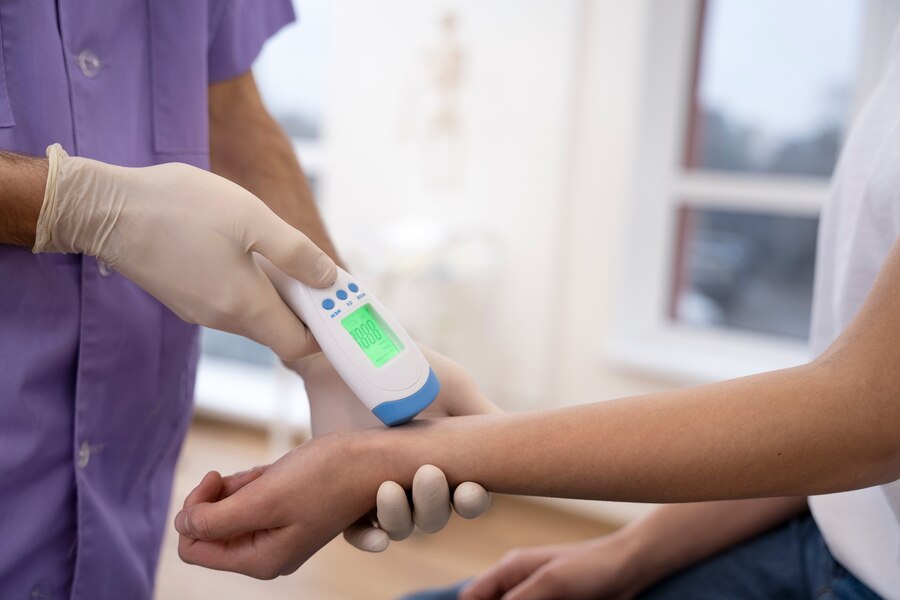
Introduction
Podimetrics, in partnership with PureSpectrum, reveals that 65% of Medicaid beneficiaries with type 2 diabetes also face at least one chronic behavioral health condition. These findings underscore the need for more comprehensive healthcare approaches that integrate behavioral health, physical health, and advanced monitoring technologies to support patients effectively.
Key Findings from Podimetrics Survey
Mental Health Challenges Among Medicaid Beneficiaries
These statistics reveal that diabetes and behavioral health challenges are deeply intertwined, significantly impacting patients’ overall quality of life. As Jon Bloom, CEO of Podimetrics, noted, “Living with diabetes is a full-time job.” For many Medicaid beneficiaries, this job is even more demanding when combined with mental health conditions.
Behavioral Health Conditions Impacting Type 2 Diabetes
The interaction between diabetes and behavioral health issues complicates diabetes management, as conditions like depression and anxiety can lead to neglect of diabetes care routines. Dr. Denise Levy, a podiatrist with experience in treating patients, notes that many patients face “diabetes distress,” a condition where mental health challenges exacerbate the already taxing burden of managing diabetes.
The survey highlights the urgent need for Medicaid programs to invest in behavioral health alongside physical health support, offering a comprehensive approach that improves outcomes for patients with complex needs.
The Need for Integrated Behavioral and Physical Health Care
Benefits of Holistic Care for Diabetes
Treating diabetes in isolation from other chronic conditions is insufficient for Medicaid beneficiaries facing behavioral health challenges. An integrated care model can make a significant difference by addressing both the physical and emotional aspects of diabetes management. The survey showed that many beneficiaries desire a more holistic approach, which could help reduce the mental and physical strain associated with chronic disease management.
Implementing a “whole person” care approach could offer Medicaid beneficiaries support not only for physical symptoms but also for behavioral health challenges, potentially improving adherence to treatment plans and overall health outcomes.
Pilot Programs for Comprehensive Diabetes Care
To address these complex healthcare needs, Podimetrics is collaborating with Montefiore Medical Center on a pilot program that focuses on preventing diabetic foot ulcers, a common issue that can lead to serious complications. Such pilot programs demonstrate the value of integrating physical and behavioral healthcare to deliver comprehensive support. Programs like these could inspire Medicaid programs nationwide to adopt integrated care models that cater to the diverse needs of beneficiaries living with type 2 diabetes.
High Demand for Remote Patient Monitoring and Innovative Tools
Potential Benefits of Remote Patient Monitoring (RPM)
Medicaid beneficiaries in the survey showed strong interest in remote patient monitoring (RPM) as a tool to better manage their health. According to the findings:
RPM allows healthcare providers to track patients’ health metrics remotely, which is particularly valuable for managing chronic conditions like diabetes. When used effectively, RPM can help detect complications early, reducing the need for costly emergency interventions.
Challenges and Gaps in Accessing RPM
Despite the enthusiasm for RPM, many Medicaid beneficiaries with type 2 diabetes do not have access to this technology. The survey found that 79% of respondents are not using any RPM devices, and of the 21% who do, more than half lack clinical support services associated with their devices.
This gap in access to RPM and clinical support indicates a significant opportunity for this programs to expand coverage for RPM and digital tools. By offering RPM as part of its benefits, states can empower beneficiaries to manage their health proactively, reducing long-term costs and improving health outcomes.
Medicaid beneficiaries expressed a strong interest in digital health resources, with 78% stating that should provide more digital tools to assist in managing their conditions. By increasing access to RPM and other technologies, this programs can support beneficiaries more effectively and potentially reduce the burdens of diabetes and behavioral health conditions.
Conclusion
The Podimetrics survey highlights the challenges Medicaid beneficiaries with type 2 diabetes face, especially those who also manage behavioral health conditions. Integrating behavioral health care with diabetes management is essential for achieving better outcomes and supporting patients in both body and mind. By addressing the high demand for remote patient monitoring and expanding access to innovative digital tools, this programs can improve the quality of life for beneficiaries and reduce long-term healthcare costs.
Discover the latest GovHealth news updates with a single click. Follow DistilINFO GovHealth and stay ahead with updates on medical advancements. Join our community today!
FAQs
1. Why do Medicaid beneficiaries with diabetes face more behavioral health challenges?
Ans: Managing diabetes is demanding and can be emotionally taxing, often leading to conditions like depression and anxiety. The stress associated with diabetes self-management can worsen mental health, especially among underserved populations.
2. What is the role of remote patient monitoring (RPM) in diabetes care?
Ans: RPM allows healthcare providers to monitor patients’ health metrics in real-time, enabling early intervention for complications and reducing emergency room visits.
3. How can Medicaid programs better support beneficiaries with diabetes and mental health conditions?
Ans: It can expand coverage for integrated behavioral health services, support remote patient monitoring, and offer more digital tools to help beneficiaries manage their conditions holistically.
